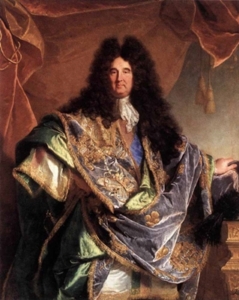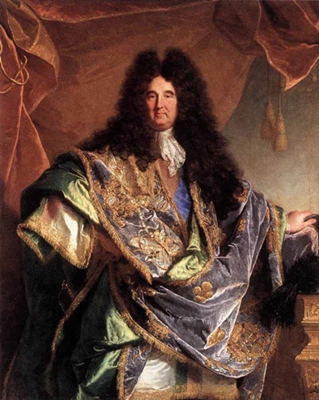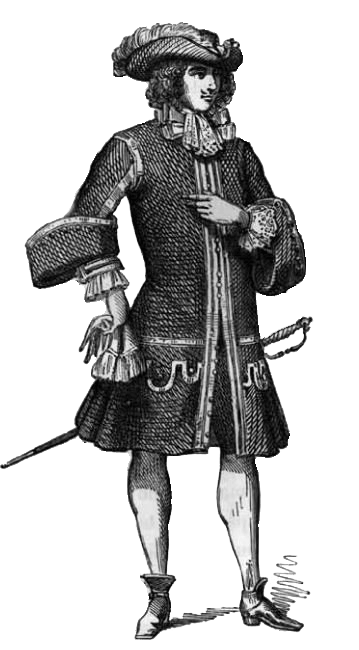Dangeau’s Diary, March 1691

4th. – Monsieur Villeneuve, the King’s barber, who also waited upon Monseigneur, has been dismissed from court with a prohibition never to present himself again before the King or Monseigneur. His dismissal is in consequence of his debaucheries.
6th. — There was a salon this evening at which the King was not present, being much engaged in business. Monseigneur and Monsieur played at lansquenet and there was neither music nor portico.
7th — at Marly, Monseigneur had already arrived here, after having hunted the stag at Sant-Germain. There were more ladies this journey than usual and the King had a third table set. Several ladies slept in the anti-chambers of the Princesses, there not being separate accommodations for them. Four ladies, who are unaccustomed to be here, accompanied the court. They are Mademoiselles d’Estrées, de Melun, d’Uzès and de Croissy.
15th . — Madame de Montespan, who for some days past has been at Saint Joseph, has notified to the King, through Monsieur de Meaux, that she had determined to bid an eternal farewell to the court. She will reside partly at Saint Joseph.
16th. — The King of England was very desirous of accompanying the King to the siege of Mons, but the King, on account of the inconvenience to which it might give rise, requested he would remain at Saint-Germain. The King has not yet named his aids-de-camp. He has merely announced, that all those who had been so formerly and who were desirous of serving him, should be appointed. The others he will choose upon his arrival at the camp. Monseigneur will nominate his at the same time.
18th. — Monsieur de Louvois informs the King that he has permitted a citizen of Mons to leave the town, he being the bearer of letters to Pere la Chaise, from the canonesses and the Jesuits of the city, begging that he would entreat the King not to bombard their churches. His person affirms, that the inhabitants think the place will soon be taken. The King, upon arriving at night, closetted himself and was much engaged in writing. Monsieur de Croissy and Monsieur de Saint-Pouanges follow the King at the distance of a day’s journey. Monseigneur, upon his arrival, played with the courtiers at cul-bas and lansquenet.
21st. — The King dined in front of the lines. He then proceeded to the Abbey de Belliane, where he fixed his headquarters. He rode round the town and was for some time within half a musquet shot. One of our videttes stopped him; someone said to him “Do you not know the King?” “To be sure,” answered the soldier “but surely it cannot be he who advances so forward.” A cannon ball killed the horse of Monsieur de la Chenaye, very near the King, and by the side of the Comte de Toulouse, who first ordered a fresh horse to be given to Monsieur de la Chenaye, and then said “What? A cannon shot, is that all!” The Comte de Toulouse is not more than thirteen years of age.
22d. — The King is continually engaged; for, after giving his orders as a general, he attends in his royal capacity to the other affairs of state, the least of which he does not neglect.
23rd. — Whilst the King was at dinner, an artillery officer belonging to the enemy, was brought before him. He had endeavoured to get into Mons, through the work which was commenced this morning. He has been in the camp three days and had made many endeavours to effect his purpose, but all the posts were too well guarded for him to succeed. The King questioned him very closely. He said, he was to have commanded the artillery in Mons and assured the King that he would not take the place without giving battle. The King answered him coldly “Sir, we are here for that purpose.”
27th. — Notwithstanding his gout, the King mounted his horse and proceeded straight to the trenches. He alighted opposite the battery; he then visited the fortification which has been raised, as well as the most advanced batteries. He was not satisfied with this, but, in order to have a better view, exposed himself very much. He was even much displeased with the courtiers, who wished to prevent him, and ascended the parapet of the trench, where he remained a considerable time. The enemy might easily have recognized his features, he was so near. Monsieur le Grand (Louis de Lorraine), who was near him, was thrown down by the earth of the parapet, which had been struck by a cannon ball, and was completely covered with it, without, however, having been wounded.
29th. — Monsieur de Toulouse mounted guard in the trenches, at the head of his regiment, but the King would not permit him to pass the night there.
30th.— Notwithstanding all the occupations accompanying a siege, the King holds his council as usual and attends to the business of the state, the same as if he were at Versailles.
31st . — The King did not go out this morning. Monseigneur went to the trenches; he was very liberal, according to custom. When the King was there three days ago, he gave five hundred pistoles to the soldiers. Monseigneur gave them three hundred today.


